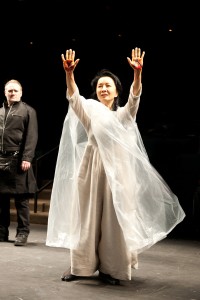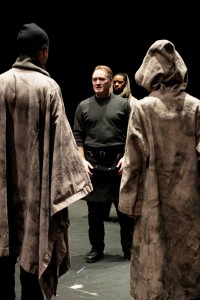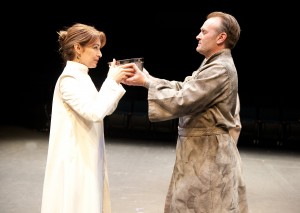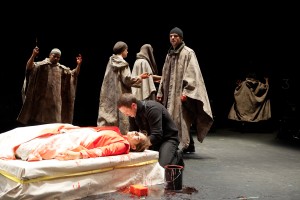GREAT CAESAR’S GHOST
As directors continue to re-invent theatre, especially the classics, there is a bent to color-blind and gender-bending casting. The mixed-color cast on hand exemplifies just how powerful this mechanism can be: the story of a small group of people who take government into their own hands via assassination becomes a universal examination of a world-wide need for leaders – as well as a warning to those who believe the removal of a feared leader will only bring about positive change. This modern take brings to mind the current mid-East revolutions that topple regimes with no government to put in its place – an occasion that often propagates anarchy more than peace.
 Although this production is thrilling, the decision to cast a woman as Caesar is a head-scratcher. Through no fault of actress Vilma Silva, it is simply not enough to exchange pants for gown and think you are making a statement. The sex change added nothing and there was no apparent reason behind this choice; in fact, it is somewhat distracting. If Caesar is a woman, why was the character of Caesar’s wife, Calpurnia, removed from the play? Could the wife not be cast as a man? Or, better yet, make Caesar a lesbian – now there’s a threatening motivation! The lines of the wife were almost arbitrarily given to Mark Antony; as long as dramaturg Lue Morgan Douthit is editing Shakespeare, it’s a shame that there was no way to
Although this production is thrilling, the decision to cast a woman as Caesar is a head-scratcher. Through no fault of actress Vilma Silva, it is simply not enough to exchange pants for gown and think you are making a statement. The sex change added nothing and there was no apparent reason behind this choice; in fact, it is somewhat distracting. If Caesar is a woman, why was the character of Caesar’s wife, Calpurnia, removed from the play? Could the wife not be cast as a man? Or, better yet, make Caesar a lesbian – now there’s a threatening motivation! The lines of the wife were almost arbitrarily given to Mark Antony; as long as dramaturg Lue Morgan Douthit is editing Shakespeare, it’s a shame that there was no way to  incorporate that Caesar’s power as a woman was one of the driving forces behind the assassination.
incorporate that Caesar’s power as a woman was one of the driving forces behind the assassination.
Still, this exquisitely-staged, sharp-paced, and fiery outing is supported by a ferocious cast: Gregory Linington brings a combination of impatience and ardor to Cassius, the chief schemer against Caesar; The famous speech in which Mark Antony placates the assassins while manipulating the Roman populace is a revelation as played by Danforth Comins; and Ako is most memorable as a desperate Soothsayer (she also speaks her lines as a rebel in Japanese!). Some of Ms. Silva’s most fascinating moments are when she haunts the later scenes as Caesar’s ghost – director Amanda Dehnert has the ghost appear in more scenes than Shakespeare’s text, and Ms. Silva’s steely-eyed stares and glares almost give us permission to judge the conspirators as well.
Dehnert has unleashed the dogs of war in this breathtaking production — it yaps, bays and howls with excitement, and although the revolution of gender-bending casting can only be chalked up to diversity, the diversity of this cast sheds light on the origins of revolution.
Julius Caesar
New Theatre
Oregon Shakespeare Festival
Ashland, Oregon
ends on November 6, 2011
for tickets, call 800.219.8161 or visit OSF




